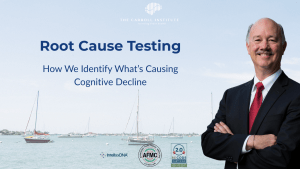Last Updated: October 2025
Most people know that what happens in the gut affects digestion, but few realize how deeply it influences the brain. When the gut becomes inflamed or leaky, it sends distress signals throughout the body—including directly to the brain. This chronic “gut-brain inflammation loop” is one of the hidden root causes of cognitive decline. At The Carroll Institute in Sarasota, Dr. Garland Glenn, DC, PhD, AFMC helps patients repair gut health to restore mental clarity, memory, and focus through the Bredesen ReCODE Protocol and Functional Neurology.
What Is the Gut-Brain Axis?
The gut and brain are constantly communicating through a network of nerves, hormones, and immune signals known as the gut-brain axis. This two-way pathway is so powerful that the gut is often called the “second brain.” A healthy gut sends positive signals that support mood and cognition, while an inflamed or imbalanced gut can trigger anxiety, brain fog, and memory loss.
Recent research from the National Institutes of Health shows that intestinal inflammation and dysbiosis—an imbalance in gut bacteria—can directly contribute to neuroinflammation and neurodegeneration. In simpler terms, when the gut is unwell, the brain suffers too.
Understanding Leaky Gut and Leaky Brain
When the gut lining becomes “leaky,” small gaps allow undigested food particles, toxins, and bacteria to pass into the bloodstream. The immune system sees these particles as threats and mounts a defense, creating chronic inflammation. Over time, this inflammation spreads throughout the body, even affecting the blood-brain barrier—the brain’s protective filter.
Once the blood-brain barrier becomes leaky, toxins and inflammatory molecules can enter brain tissue, causing what many experts call “leaky brain.” This results in symptoms like poor focus, fatigue, and memory loss. It’s a vicious cycle: leaky gut leads to leaky brain, and leaky brain makes it harder to regulate the gut.
Common Signs of Gut-Brain Imbalance
Because the gut and brain are connected, gut issues often show up as neurological or emotional symptoms. You may be dealing with gut-brain imbalance if you experience:
- Brain fog, fatigue, or slow thinking
- Frequent bloating, gas, or digestive discomfort
- Food sensitivities or autoimmune conditions
- Unexplained anxiety or mood swings
- Difficulty focusing or recalling information
Many patients are surprised to learn that addressing gut inflammation can dramatically improve mental clarity and energy. As the gut heals, the brain often follows.
How the Gut Microbiome Shapes Brain Function
The gut microbiome—a diverse community of bacteria living in your intestines—plays a crucial role in brain health. These microbes produce neurotransmitters such as serotonin and dopamine, which regulate mood, motivation, and cognition. When harmful bacteria outnumber beneficial ones, the resulting imbalance (dysbiosis) can trigger inflammation and neurotransmitter disruption.
Studies show that patients with Alzheimer’s disease often have an altered gut microbiome composition compared to healthy adults (NIH, 2023). Restoring microbial balance can reduce inflammation and promote better brain signaling.
Root Causes of Gut-Brain Disruption
- Poor diet: Refined carbs, sugar, and processed foods feed inflammatory bacteria and yeast.
- Stress: Chronic stress lowers stomach acid and alters gut motility, impairing digestion.
- Antibiotic use: Repeated antibiotics can wipe out beneficial bacteria, allowing pathogens to thrive.
- Toxins and mold: Environmental toxins and mycotoxins damage the intestinal lining and immune system.
- Infections: Hidden infections such as H. pylori, candida, or parasites can sustain chronic gut inflammation.
Functional Neurology and Gut-Brain Healing
At The Carroll Institute, Dr. Glenn integrates Functional Neurology with Functional Medicine to restore balance to both the gut and the brain. While Functional Medicine focuses on repairing the gut lining and reducing inflammation, Functional Neurology helps retrain the brain’s communication with the gut through the vagus nerve.
Dr. Glenn also utilizes tools like the Neuronic Photobiomodulation Helmet to improve blood flow and neural signaling, promoting gut-brain balance at a cellular level. This multi-system approach helps patients achieve results faster and more sustainably than diet changes alone.
Rebuilding a Healthy Gut-Brain Connection
Restoring the gut-brain axis involves both removing triggers and rebuilding protective barriers. Depending on lab testing and symptom patterns, your personalized plan may include:
- Anti-inflammatory, low-carb, whole-food nutrition
- Probiotics and prebiotics to support beneficial bacteria
- Targeted gut repair nutrients like glutamine, zinc, and omega-3s
- Mind-body and vagus nerve stimulation exercises
- Detoxification protocols to eliminate harmful compounds
- Stress and sleep optimization to restore natural healing rhythms
Most patients begin noticing improvement in digestion, focus, and mood within a few weeks. Over several months, cognitive testing often shows measurable gains as inflammation decreases and communication between the gut and brain improves.
Take the First Step Toward Healing Your Gut and Brain
If you’ve been struggling with brain fog, digestive issues, or unexplained fatigue, your gut may be sending distress signals to your brain. With the right testing and guidance, it’s possible to calm inflammation, heal your gut, and reclaim your mental clarity. Book a Discovery Call with The Carroll Institute today to begin your personalized gut-brain recovery plan.
Sources
- Rationale for a Multifactorial Approach to Reversing Cognitive Decline — NIH (2022)
- Precision Medicine Approach to Alzheimer’s Disease — NIH (2023)
Medically reviewed by Dr. Garland Glenn, DC, PhD, AFMC (Advanced Functional Medicine Clinician)
The Carroll Institute — Sarasota, FL
Learn more about Dr. Glenn’s background and credentials: About Dr. Garland Glenn
This content is for educational purposes only and does not replace personalized medical advice.

Dr. Garland Glenn, DC, PhD, IFM, AFMC
Founder & Clinical Director, The Carroll Institute — Sarasota, FL
Dr. Garland Glenn is a board-certified chiropractic physician and functional medicine practitioner specializing in cognitive health, neurodegeneration, and root-cause medicine. Certified as an AFMC (Advanced Functional Medicine Clinician) and Institute for Functional Medicine (IFM) trained, he has also completed over 500 hours of advanced training in Functional Neurology under Dr. Ted Carrick, founder of the Carrick Institute.
At The Carroll Institute, Dr. Glenn leads Sarasota’s only ReCODE-certified Functional Neurology program, helping patients reverse or prevent cognitive decline through the Bredesen ReCODE Protocol, neuroplasticity exercises, and personalized functional medicine care.
Learn more about his background and approach at About Dr. Garland Glenn.
– schedule now –
free discovery call
To help you get started, we offer a free 20-minute Discovery Phone Consultation. During this call, you will be able to talk with one of our Certified Brain Health Coaches about what going on with you or your loved one and find out if we can help. Please review our FAQs prior to scheduling your free call. We look forward to talking with you soon and helping you Save Your Brain.
(yes, it’s totally free!)
ReCODE® is a registered program developed by Dr. Dale Bredesen and licensed through Apollo Health. Dr. Garland Glenn is a certified ReCODE practitioner.



